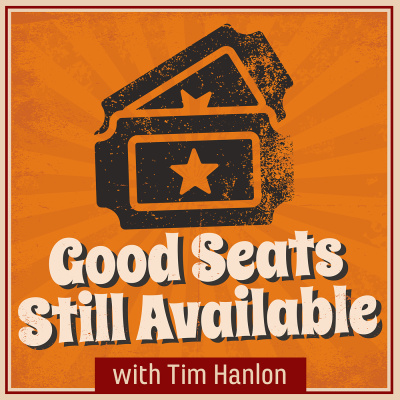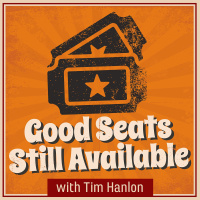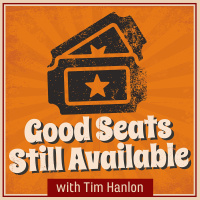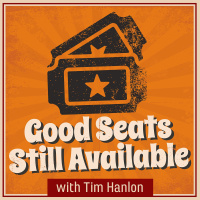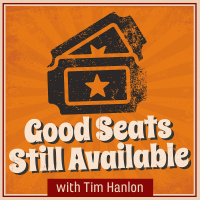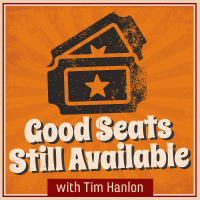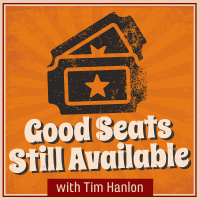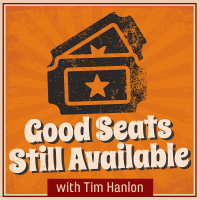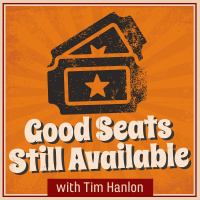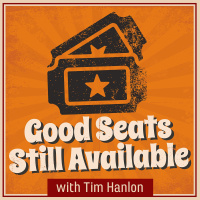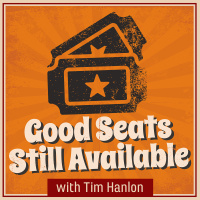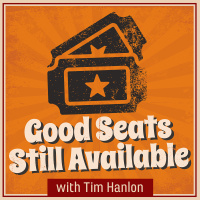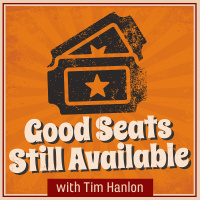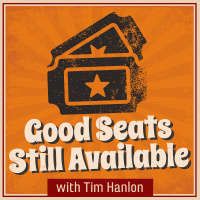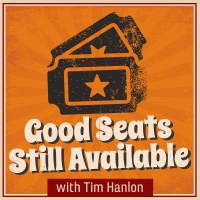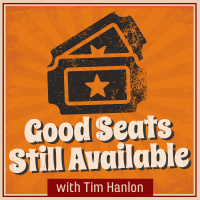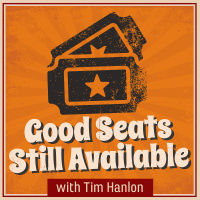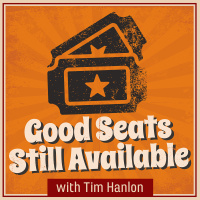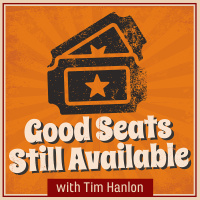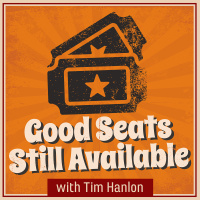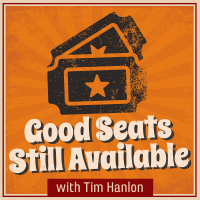Synopsis
Good Seats Still Available is a curious little podcast devoted to the exploration of what used-to-be in professional sports. Each week, host Tim Hanlon interviews former players, owners, broadcasters, beat reporters, and surprisingly famous "super fans" of teams and leagues that have come and gone - in an attempt tounearth some of the most wild and woolly moments in (often forgotten) sports history.
Episodes
-
131: Calling Balls & Strikes in Baseball’s Negro Leagues – With Byron Motley
23/09/2019 Duration: 01h22minMulti-talented singer-songwriter, photographer, and soon-to-be sports history documentarian Byron Motley joins the show this week to discuss his late father’s colorful career as an umpire in baseball’s legendary Negro Leagues – the subject of his 2007 collaborative oral history, Ruling Over Monarchs, Giants, and Stars. A child of Depression-era rural Alabama, a teenaged Bob Motley migrated north in the early 1940s to his uncle’s home in Dayton, OH in search of work – and a tryout as a Negro League pitcher. World War II intervened, and Motley was soon off to the front lines as one of the first African-Americans in the then-segregated (Montfort Point) Marines – receiving both a Purple Heart (shot in the foot during combat) and a Congressional Gold Medal of Honor for his service. While recovering from his wounds, Motley caught wind of a baseball game outside his military hospital and volunteered to umpire – crutches and all. Despite earning him an immediate trip back to the battlefield, it set the stage for hi
-
130: St. Louis: The Original Soccer City USA – With Dave Lange
16/09/2019 Duration: 01h26minOn August 20, 2019, the city of St. Louis, MO was officially awarded the 28th franchise in Major League Soccer, with an anticipated inaugural season beginning in 2022. And while the club begins its efforts to get its team name, new downtown stadium and initial soccer operations in place, we take some time this week to reflect on the city’s deep and rich soccer history – perhaps unmatched by any locale in the United States. Dave Lange (Soccer Made in St. Louis: A History of the Game in America’s First Soccer Capital) joins the ‘cast to trace the undeniably symbiotic relationship between the Gateway City and the Beautiful Game – as well as its impact on the development of the sport (especially professionally) across America. As we root for the new St. Louis MLS team (our name suggestion: Gateway FC!) to meaningfully recognize and incorporate this important past, Lange helps tide us over in the interim as he discusses: The St. Louis transplant who help launch both the USA’s first governing body for the sport,
-
129: ABA Basketball's Origin Story – With Founder Dennis Murphy
09/09/2019 Duration: 55minThe American Basketball Association was not founder Dennis Murphy’s original intent. Thwarted in his attempt to get the fast-growing city of Anaheim, CA (he was mayor of nearby Buena Park) into the fledgling American Football League during the mid-1960s, Murphy quickly pivoted his attention to basketball – reasoning that with only 12 teams in the staid, yet long-established National Basketball Association, there surely must have been room for more. “What the hell,” Murphy told author Terry Pluto in his seminal 1990 oral history Loose Balls. “The AFL had worked, hadn't it? Maybe we could force a merger with the NBA." By the end of the ABA’s ninth season in 1976, Murphy’s unwitting prescience had become reality – and along with it, a validating blueprint for how to modernize professional sports in North America. The legendarily inveterate sports entrepreneur (Murph: The Sports Entrepreneur Man and His Leagues) joins the podcast to discuss how the iconically idiosyncratic ABA got started, as well as hints of
-
128: NASL Soccer’s Chicago Sting – With Mike Conklin
02/09/2019 Duration: 01h44minProlific Chicago Tribune sportswriter Mike Conklin (Goal Fever!; Transfer U.) joins the podcast to help us go deep into the story of the North American Soccer League’s twice-champion Chicago Sting – a club he covered extensively and exclusively from its little-noticed launch in late 1974 all the way through its breakthrough Soccer Bowl ’81 title. The personal passion project of prominent Chicago commodities trader Lee Stern, the Sting came to life as one of five expansion franchises for the NASL’s ambitious 1975 campaign, and the team’s early seasons were heavily British-flavored under coach (and former Manchester United legend) Bill Foulkes. Despite winning a division title in 1976, the Sting was largely uncompetitive during its first few seasons – and worse, drew poorly as the team shuffled games between Soldier Field, Comiskey Park, and Wrigley Field each summer. By 1978 – when they went 0-10 to start the season – the Sting had the worst attendance in the entire 24-team NASL, averaging a mere 4,188 fans
-
127: A British View of US Pro Soccer History – With Tom Scholes
26/08/2019 Duration: 01h24minUK sportswriter Tom Scholes (Stateside Soccer: The Definitive History of Soccer in the United States) joins host Tim Hanlon to discuss the surprisingly long, colorfully vibrant and regularly misunderstood history of the world’s most popular sport in America. While even the most erudite of the game’s international scholars mistakenly (though understandably) define the US pro game’s epicenter as the chaotic, post-1966 World Cup launch of the North American Soccer League – the roots of organized soccer actually date as far back as the American Civil War, around the time when the first rules around “American football” were also coming into focus. In fact, US soccer’s actual first “golden age” can be traced to the Roaring 1920s when immigrant-rich corporate teams in the first American Soccer League rivaled the nascent National Football League in popularity, and US national teams regularly qualified for the first-ever FIFA World Cups in 1930 (finishing third) and 1934. While a heavily ethnic successor ASL and regio
-
126: CBA Basketball’s Fort Wayne Fury – With Rob Brown
19/08/2019 Duration: 01h40minAfter extraordinary listener response to our Episode #118 with David Levine a few months back, we bounce-pass our way back to the endlessly intriguing Continental Basketball Association for this week’s conversation – this time with a focus on the league’s travails during the 1990s, courtesy of the Fort Wayne (IN) Fury and its former radio voice/media relations director Rob Brown. More than forty years since the relocation of the NBA’s seminal Pistons from the Summit City to Detroit (and a decade before the arrival of the current-day G-League Mad Ants), the Fury held court at the city’s Allen County War Memorial Coliseum from 1991 until the league’s first demise in 2001 – winning the CBA’s regular season title in 1998, after narrowly losing the league championship finals two seasons earlier. Brown recounts some of his standout memories from his time with the Fury, including: Playing second fiddle to the Komets, Fort Wayne’s minor league hockey juggernaut; The harrowing 50-foot fall of team mascot “Sabre” from
-
125: San Jose Sharks Broadcaster Randy Hahn
12/08/2019 Duration: 01h21minBefore embarking on his incredible 29-year (and counting) run as play-by-play lead for NHL hockey’s San Jose Sharks, NBC Sports California sportscaster Randy Hahn was first known to 1980s pro soccer audiences as the versatile radio and TV voice behind the short-lived Edmonton Drillers of the North American Soccer League as well as the dynastic San Diego Sockers of both the NASL and the Major Indoor Soccer League. We descend deep into the Good Seats audio archives to revisit some of the more memorable (and sometimes downright forgettable) moments from Hahn’s North American indoor and outdoor soccer broadcasting exploits, including: Covering the original NASL Vancouver Whitecaps at a commercial station while still a college student at the University of British Columbia; Answering the call for a last-minute/first-ever radio play-by-play assignment for a Drillers “outdoor” game in Houston; Learning the differences between calling slower-building outdoor matches vs. the faster-moving indoor game; Winning “One for
-
124: The CFL’s Baltimore Stallions – With Ron Snyder
05/08/2019 Duration: 01h22minSportswriter Ron Synder (The Baltimore Stallions: The Brief, Brilliant History of the CFL Champion Franchise) joins to delve into the story of the mostly-forgotten team that revitalized Baltimore’s pro football history and viability. When the National Football League’s Baltimore Colts secretively absconded to Indianapolis in the wee hours of March 29, 1984, three decades of pro football history left with them. Subsequent dalliances with the USFL’s nominally “Baltimore” Stars in 1985, and ill-fated attempts to rejoin the NFL (1987’s wooing of the St. Louis Cardinals & 1993’s proposed expansion “Bombers”) only deepened local pigskin fans’ despair. In the wake of the expansion disappointment, entrepreneur and ex-Washington Redskins assistant Jim Speros saw an opportunity to bring the newly expanding Canadian Football League to Charm City as a viable replacement in 1994. Capitalizing on the city's love for its cherished NFL franchise, Speros tapped directly into Colts nostalgia by adopting the original team
-
123: Ballpark Architecture and the American City – With Paul Goldberger
29/07/2019 Duration: 01h23minWe amp up the intellectual quotient this week with Pulitzer Prize-winning architecture critic Paul Goldberger (Ballpark: Baseball in the American City), as we delve into the inextricably historical bond between the rise of America’s favorite pastime and the evolution of the American city. From the first “saloons in the open air” of the late-1800s, such as Brooklyn, NY’s Union Grounds; to the ornate turn-of-the century wooden structures of Chicago’s Lakefront Park, Boston’s South End Grounds, and St. Louis’ Sportsman Park; to the early-1900s’ steel-and-stone “Golden Era” ballparks headlined by Philadelphia’s Shibe Park, Cincinnati’s Crossley Field, Detroit’s Tiger Stadium, Boston’s Fenway Park, Chicago’s Wrigley Field, and Brooklyn’s Ebbets Field; to the suburban, multi-purpose (and exceedingly TV-friendly) “concrete donuts” of the 1960s; to the retro “urban renaissance” ushered in by Baltimore’s Camden Yards in 1992 – Goldberger discusses how baseball's architectural maturation is undeniably concurrent with
-
122: Black Pioneers of the NASL – With Patrick Horne
22/07/2019 Duration: 01h22minBrooklyn College women’s soccer head coach and former NASL (Memphis Rogues, New England Tea Men) and ASL (New Jersey Americans) pro player Patrick Horne (Black Pioneers of the North American Soccer League) joins the podcast to help shine a light on the largely unrecognized contributions of black players to both the success of North America’s first major foray into pro soccer, and the growth of the sport’s popularity in the US and Canada in the decades since. While no one disputes the significance of the June 1975 signing of Brazilian superstar Pelé to the league’s flagship New York Cosmos as the watershed that legitimized soccer’s viability as a professional sport in North America (major world-class talent like Portuguese legend Eusebio and Brazilian star defender Carlos Alberto quickly followed), black players from various corners of the globe had already been plying their trade in the fledgling NASL years before – some as early as the competing 1967 leagues (NPSL and USA) that preceded it. And many of them
-
121: More Milwaukee Braves Baseball – With Patrick Steele
15/07/2019 Duration: 01h36minIt’s been nearly two years since our first look at baseball’s still-revered Milwaukee Braves, and this week – courtesy of author/historian Patrick Steele (Home of the Braves: The Battle for Baseball in Milwaukee) – we finally get the chance to go deeper into the team that, in its brief 13-season run: never posted a losing season, won two National League pennants, and, in 1957, brought “Cream City” its first and only World Series championship. Featuring a stellar lineup of mostly Braves farm club-developed players (including eventual Hall of Famers Henry [Hank] Aaron, Warren Spahn, Eddie Matthews, Red Schoendienst, and Phil Niekro) the team immediately won the hearts of Wisconsin sports fans upon its hasty arrival from Boston in the midst of the 1953 pre-season – shattering then-modern-day attendance records, and ushering the city of Milwaukee into the world of America’s proverbial “big leagues.” The Braves' surprising success in Milwaukee during the mid-1950’s prompted Major League Baseball to redefine itsel
-
120: The Portland Timbers’ Origin Story – With Michael Orr
08/07/2019 Duration: 01h40minAs the 2019 version of the Portland Timbers celebrates its 10th season in Major League Soccer, we spin the WABAC Machine dial back 44 years earlier to 1975 – when the club’s original namesake became an overnight sensation (figuratively and literally) in the then-20-team North American Soccer League. The last of the NASL’s five newly announced sides for that season (along with Chicago, San Antonio, Tampa Bay, and Hartford), the “Timbers” weren’t even named (via an open “name the team” contest) until March of 1975 – just two months after having been awarded the franchise, and barely a month before its first scheduled pre-season match. Despite the haste, the Timbers immediately became the toast of both the Rose City and the league during the summer of 1975, as the club compiled the NASL’s best regular season record, earned a trip to the league championship “Soccer Bowl” (losing to the Rowdies 2-0), and regularly drawing 20,000+ crowds to Portland’s venerable Civic Stadium – earning the self-appointed moniker “S
-
119: The Alliance of American Football Saga Continues – With Michael Rothstein
01/07/2019 Duration: 01h32minWe veer back this week into the still-unfolding mess that is (or was) the Alliance of American Football with ESPN.com “NFL Nation” reporter Michael Rothstein – who, along with ESPN Senior Writer Seth Wickersham – has been chronicling the demise of the once-promising league (Inside the Short, Unhappy Life of the Alliance of American Football), dating back to its curious pre-season earlier this winter. With Carolina Hurricanes owner and last-minute financial savior Tom Dundon recently suing the now-bankrupt league for the return of his complete $70 million investment, the story of the Alliance is getting uglier by the week – with little end to the drama in sight. Despite helping nearly 60 of its players (and counting) sign NFL contracts, the AAF is increasingly likely to be remembered for its shaky finances and off-field managerial intrigue than for its surprisingly high quality of on-field play. Rothstein recounts some of the more interesting stories and tidbits gleaned from his months of covering the format
-
118: The Continental Basketball Association – With David Levine
24/06/2019 Duration: 01h36minAuthor and former SPORT magazine writer David Levine (Life on the Rim: A Year in the Continental Basketball Association) joins the ‘cast to give us our first taste of the quirky minor league basketball circuit that began as a Pennsylvania-based regional outfit in 1946 (predating the NBA’s formation by two months), and meandered through a myriad of death-defying iterations until whimpering into oblivion in 2009. Often billed throughout its curious history as the "World's Oldest Professional Basketball League," the colorful Continental Basketball Association rocketed into the national sports consciousness during the 1980s – when expansion into non-traditional locales (e.g., Anchorage, AK; Casper, WY; Great Falls, MT; Atlantic City, NJ); innovative rule changes (e.g., sudden-death overtime, no foul-outs, a seven-point game scoring system); and headline-grabbing fan promotions (e.g., “1 Million Dollar Supershot," "Ton-of-Money Free Throw," "CBA Sportscaster Contest") – garnered its first national TV coverage, an
-
117: The Chicago Cubs Origin Story – With Jack Bales
17/06/2019 Duration: 01h23minUniversity of Mary Washington research librarian and baseball historian Jack Bales (Before They Were the Cubs: The Early Years of Chicago's First Professional Baseball Team) joins the podcast to help us dig into the surprisingly rich history of Major League Baseball’s long-time North Side Chicago franchise well prior to 1903, when they formally adopted their now-signature nickname. While even some of the most ardent of Chicago Cubs fans unwittingly believe that year to be the team’s first season (it was actually their 28th in the National League, as well as 34th as a professional baseball club); and the “friendly confines” of Wrigley Field to be their original and only home (in fact, not until 1916 when they adopted the former Federal League Chicago Whales’ Weeghman Park, their sixth place of residence dating back to 1870) – the history of the “Cubs” long predates their apocryphal launch. Bales touches on some of the cornerstones of primordial Cubs history including: Their actual start in 1870 as the Chicag
-
116: A Thinking Man’s Guide to Defunct Leagues – With Stephen Provost
10/06/2019 Duration: 01h17minThis week, we offer a refresher course in the history of forgotten pro sports leagues with veteran newspaper editor, current long-form author and fellow defunct sports enthusiast Stephen Provost – whose recent book A Whole Different League is an essential primer for anyone seeking an entrée into the genre. Provost serves up a smorgasbord of highlights gleaned from his personal memories of and research into the various nooks and crannies of what “used-to-be” in professional team sports, including: The curiosity of 9,000 Los Angeles Aztecs NASL soccer fans in a cavernous 100,000-seat Rose Bowl; The oft-forgotten Continental Football League of the late 1960s, operating in the shadows of the mighty NFL and colorful AFL; The enigmatic one-season wonder of the 1961-62 National Bowling League; Jackie Robinson’s almost pro football career; Federal League all-star Benny Kauff and the major league baseball career-ending auto theft he didn’t commit; AND The legend of the World Football League’s Jim “King” Corcoran – th
-
115: The North American Soccer League’s Rochester Lancers – With Michael Lewis
03/06/2019 Duration: 01h46minAfter more than 40 years of covering the “beautiful game,” Newsday sportswriter and FrontRowSoccer.com editor Michael Lewis (Soccer for Dummies) knows more than a thing or two about the evolution of soccer in this country. A self-professed “Zelig of soccer,” the NYC-based Lewis has covered some of the sport’s most important events, including eight World Cups, seven Olympic tournaments, and all 23 MLS Cups (and counting) – not to mention an endless array of matches and related off-the-field activities across leagues and competitions on both the domestic and international stages over that span. If it happened in American soccer since his start as a cub reporter at the Rochester (NY) Democrat and Chronicle in 1975, Lewis was probably there. It was in Rochester that Lewis got his first taste of US pro soccer as the assigned beat reporter for the North American Soccer League’s fledgling Rochester Lancers – a team that literally helped save the down-to-four-team league from extinction in 1970 when owner Charlie S
-
114: New York’s Polo Grounds – With Stew Thornley
27/05/2019 Duration: 01h22minWe cap off the long Memorial Day holiday weekend with a look back at one of the New York metropolitan area’s most memorable sports stadiums of yore – the Polo Grounds – with author and Minnesota Twins official scorer Stew Thornley (The Polo Grounds: Essays and Memories of New York City's Historic Ballpark, 1880-1963). The “Polo Grounds” was actually the name of multiple structures across upper Manhattan during its history. As its name suggests, the original venue (1876-1889) was built for, well, polo. Located between Fifth and Sixth (Lenox) Avenues just north of Central Park, it was converted to a baseball stadium in 1880, soon becoming home to the city’s first major league pro teams – the Metropolitans of the American Association and the Gothams (later, Giants) of the National League. Pushed out by a re-gridding of the borough in 1889, the Giants relocated northward to what became the second incarnation of the park in the Coogan’s Hollow section of Washington Heights in 1890. Coincidentally, it was also t
-
113: The Alliance of American Football – With Conor Orr
20/05/2019 Duration: 01h20minJust weeks after its sudden collapse, we take our first look at the brief life of the Alliance of American Football with Sports Illustrated football writer and MMQB NFL podcast host Conor Orr (The Curious Rise and Spectacular Crash of the Alliance of American Football; More Strange Tales from the Collapse of the AAF). Inspired by his work producing the 2017 documentary This Was the XFL for ESPN Films’ 30 for 30 series, director Charlie Ebersol concluded that the renegade league co-created by his father (NBC Sports producer Dick) and World Wrestling Federation (now WWE) impresario Vince McMahon in 2001 had actually been a viable concept, but poorly executed – especially the subpar quality of on-field play. After reportedly being rebuffed by McMahon to potentially revive the old XFL brand, Ebersol instead dove into planning for his nascent AAF – with the prime focus on solid football product; the “Alliance” formally announced its launch on March 20, 2018, and by June had more than 100 players under contract. W
-
112: The Once & Future Soccer Legacy of Ft. Lauderdale’s Lockhart Stadium – With Jeff Rusnak
13/05/2019 Duration: 01h33minLong-time South Florida Sun-Sentinel soccer columnist Jeff Rusnak joins to discuss the rich past, transitional present and promising future of one of American pro soccer’s most venerable, yet historically underrated venues – Ft. Lauderdale, Florida’s Lockhart Stadium. Originally built in 1959 as an American football and track venue for four high schools in the region and named after a former city commissioner, the modest bleacher-constructed Lockhart was unwittingly transformed into the country’s first de facto “soccer specific stadium” when the (original) North American Soccer League’s Miami Toros moved 32 miles north from the cavernous Orange Bowl to become 1977’s Ft. Lauderdale Strikers. The Strikers became a South Florida sports phenomenon during their seven NASL seasons at the crackerbox Lockhart, boasting world-class talent (Gordon Banks, Gerd Müller, Teófilo Cubillas, George Best) and magnetic personalities (Ron Newman, Ray Hudson) that quickly endeared the club and the sport to an adoring fan base. Nu
